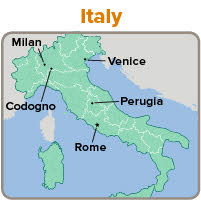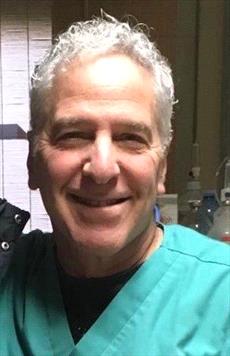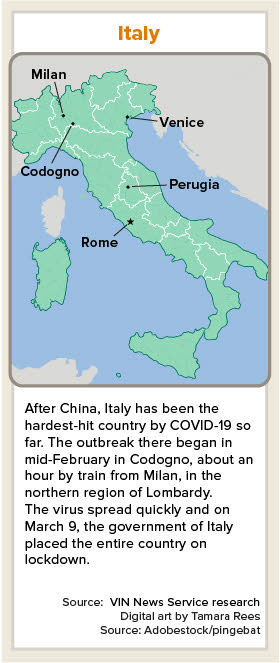
Dr. Jeffrey Bodan

Photo courtesy of Dr. Jeffrey Bodan
Writing from Perugia, Italy, Dr. Jeffrey Bodan shares his experience with the COVID-19 pandemic.
Dr. Jeffrey Bodan is an American who has been living in Italy for most of his 35-year career as a veterinarian. Married to an Italian native who teaches history, geography and Italian in a junior high school, Bodan, 66, owns a small animal hospital in Perugia. By email, he answered questions about everyday life in a country that is a world hotspot for COVID-19. As of 5:30 pm EDT, Italy had logged 80,589 cases and 8,215 deaths, according to a count kept by a Johns Hopkins University team.
When did you first become aware of the disease that's now called COVID-19? At what point did it hit home to you?
I realized in the middle of January that something was going to hit us. I was used to being short on supplies, as some products were hard to find previously, due to the exiting of Great Britain, otherwise called Brexit, from the European Common Market. I decided to stock up essential materials such as surgical gloves, surgical gowns, exam gloves and masks — essentially, what I use normally but don't think of as being difficult to obtain.
I followed the COVID-19 disaster in China as soon as I realized that bats, wonderful warm-blooded flying mammals, were suspected to be a possible host reservoir of the new virus. In Italy, I am one of the only veterinarians who tries to treat bats. My favorite bat, Alfredo, lived with us for a while, many years ago, after he broke his humerus. After I fixed the bone, he was very happy in the hospital, with free meals and lots of attention.
What was the Italian government's initial response to COVID-19, and how did it unfold?
COVID-19 hit Italy right in the face. Each day, the government kept changing their advice — probably taking the situation too lightly at first. At one point, the closure of the northern region of Italy, Lombardy in particular, created an explosion of people considered migrant workers and students to search for transportation home, usually to the southern regions where they originally came from and where their families remain. The train stations were stampeded with trolleys, bags and people. Some set up mobile homes near their family in the southern regions and some just fled, renting lodging far from the COVID-19 outbreak.
Now the limitations [on activities] are rising compared with the initial response. At first, we saw restaurants open, accommodating customers as long as the tables were distant from one another. On March 12, they were ordered to close. The government is allowing shops selling cigarettes, detergents and food; and pharmacies to remain open.
Tell us about your community.
Perugia is located in the center of Italy, a happy oasis halfway between Florence and Rome. It is a bit off the track with fewer connecting highways and less mass transport, fortunately reducing the influx of new contagion of COVID-19. Springtime is coming. Oops, I sneezed, could it be ... ?
Today (March 21), we have been told to not jog; parks are closed, therefore no playgrounds. To move around by car or by foot, we must fill out a self-certification form that allows us to pass through the checkpoints around the city, stating that there is specific reason for our leaving our home — either to go to work or the grocery store, to the pharmacy or to aid someone in dire need of something because they are too old or [otherwise] unable to do it for themselves. There are police, military police and soldiers in the streets stopping many cars and people in circulation. Our dogs are taken for their walk [while] remaining within 200 meters [656 feet] of their home. ... For the most part, Perugia seems like a ghost town.
How are people responding to government measures to contain the virus?
There are mixed feelings, of course, when personal liberty is squashed by the limitation of movement. These are sacrifices for the good of all. I support the sacrifice. My friends and clients are cooperating fully with the restrictions. Almost all economic activity has ground to a stop.
It's very quiet. I hear only the sounds of good cooking and the lovely sweet odor of a fabulous amatriciana pasta. The noise of traffic below my home is gone. It would be a great day to take a spin, with no traffic and the price of gas so low. But we can't. Everything is on standby. We must try to replenish our foodstuffs through delivery to our home so as not to go to the supermarket, where there are lines outside to limit the number of people allowed into the store at one time. Hopefully, this will reduce the contact and spread of the virus between customers and between customers and cashiers. There are often internet scares describing store or pharmacy personnel positive for COVID-19. Generalized panic.
What is the situation at hospitals nearest you?
 Our principal hospital is working hard to cure people arriving with COVID-19. The ambulances are lined up like taxis at the airport. Doctors and medical staff are working one week on and one week rest, if possible. At home, they are separated from their family — sleeping in separate rooms and eating at separate times, far from their family members. These medical workers are scared.
Our principal hospital is working hard to cure people arriving with COVID-19. The ambulances are lined up like taxis at the airport. Doctors and medical staff are working one week on and one week rest, if possible. At home, they are separated from their family — sleeping in separate rooms and eating at separate times, far from their family members. These medical workers are scared.
We feel that more tests should be done for medical staff than for soccer players or politicians, who seem to have greater and faster access to tests. Medical staff need to be able to better protect themselves and their patients. Italy is permitting its fashion and other industries to quickly produce medical personal protective equipment such as surgical gowns and masks. Think Prada masks. It's a great initiative.
Do you know anyone who has or had COVID-19? Can you tell us about how the illness manifests?
This is a sad subject. I will tell you a bit. The best side of this sad story is if you have a bit of malaise, slight fever and dry cough, you are secluded home for weeks. This is much better than a ride to the hospital, where some of my friends and their friends are showing up after a few days of malaise. They can't breathe. They need forced oxygen and a cocktail of drugs that, hopefully, reverses the terrible syndrome that this virus produces.
Have you continued working? If yes, how do you and your colleagues protect yourselves?
While the restrictions increase, veterinarians have the discretion to work as they are able. I have decided to remain open only mornings. I spend the afternoon with my "new best friend," my smartphone. I speak with and receive and send messages to clients, trying to impart information and advice helpful in this terrible moment in which we have been immersed. Actually, it's not bad once you get used to using a video call, which eliminates the biting or scratching, or both, [from patients] that we receive every day. After taking a history of the patient, I instruct clients where to direct the video camera to capture the salient points needed for me to understand the case.
Is the number of veterinary visits down? Are there restrictions on the purposes for which people may seek care for their pets?
We provide WhatsApp Smart exams by appointment principally after lunch, enabling us to concentrate during the few hours we are open every morning. If a therapy is possible after the Smart exam, I send it out via email or the same WhatsApp message system with the eventual prescription included in the message. This is feasible through the use of electronic prescriptions, which can be filled in a pharmacy simply by presenting the PIN incorporated in the prescription.
Each day, I must decide whether a client must schedule or reschedule an exam or continue with ongoing therapy for a pet's chronic illness. Emergencies are admitted, if possible. All important surgery is admitted, with precautions explained by telephone. Puppy vaccines are permitted, while annual vaccines are not. Ultrasound exams are completed in the hospital with the same safety precautions. Dermatologic, neurologic, orthopedic exams are first explicated by Smart exam, and further exams in person are scheduled to investigate the pathology. Yearly or bi-yearly dental cleaning is rescheduled. I have decided to advise clients who have aggressive dogs or cats that must be seen in the hospital to give the pet gabapentin [as a mild sedative] before the visit. Our goal is to reduce the possibility of injury to the owner, staff or myself during the transfer of the animal from the car to the examination. We don't want anyone to have to go to the emergency room in this period.
The owner and their pet are accustomed to entering together, greeting us in an informal, friendly style. Now we have a new, distant interaction. Our open hospital environment has been transformed into a closed-door, back-room exam, the kind that causes owners to imagine all the worst scenarios.
We are dressed in a surgical gown, mask, goggles or eyeglasses and gloves, which reminds them of the images they see on television, where all medical personnel are dressed in a similar manner when treating people for COVID-19 in our hospitals. We are constantly cleaning between examinations, more than before, to reduce the possibility of residual hiding places for the virus. Unfortunately, it is only the beginning of this crisis, and surely our caseload is reduced.
What effects, good or bad, has the crisis had on pets?
Our pets are outside less and therefore [at lower risk of] car accidents or poisonings. Animals on special diets are finding themselves obligated to eat what is available if the owner cannot find their special diet, considering the difficulty of going to the pet shop or receiving an internet order before they run out of supplies.
For your veterinary colleagues and others in locations at earlier stages of the epidemic, what preparations do you recommend?
VIN [the Veterinary Information Network, an international online membership community for the profession] is a valuable tool for all of us when times get tough and we have more time on our hands. Every day brings more restrictions, indecision and political rivalry. We must remain above this, zigzag constantly between the numerous requests at work and, obviously, at home. Sharing experiences quickly will generate a more tangible and correct response to this fast-moving crisis. It would be great to find an algorithm to solve this disappointing moment. Unfortunately, we weren't prepared enough, or the response is sluggish. We must keep our distance from our clients while maintaining the jovial relationship created over the years, getting as close as before to clients and patients while, at the same time, adopting the most cautious approach.
How has the emergency affected your personal and family life?
My family has more restrictions than I do. My wife teaches her junior high students using Google Suite, and my son follows his university courses by Skype, as the university he attends is closed to avoid congregation of students. My family can't leave the home area by law, and are avoiding any situation that could cause grave consequences. Spending so many hours inside together necessitates good manners, mediating all difficult scenarios. We are lucky to have more than 2,500 square feet to move around in.
What do you do to safeguard your emotional health?
I constantly remind myself that most important of all is to remain focused on providing a pleasant atmosphere at home, planning and pre-planning for the needs of everyone around me, leaving quibbling outside, where we can't go. We must move forward in our chosen work, studying innovative techniques to alleviate the dolor of this period.
I had to reroute my routine, understanding that this phenomenon will bring the future here prematurely. This might be the most interesting, motivating, creative moment in our lives.